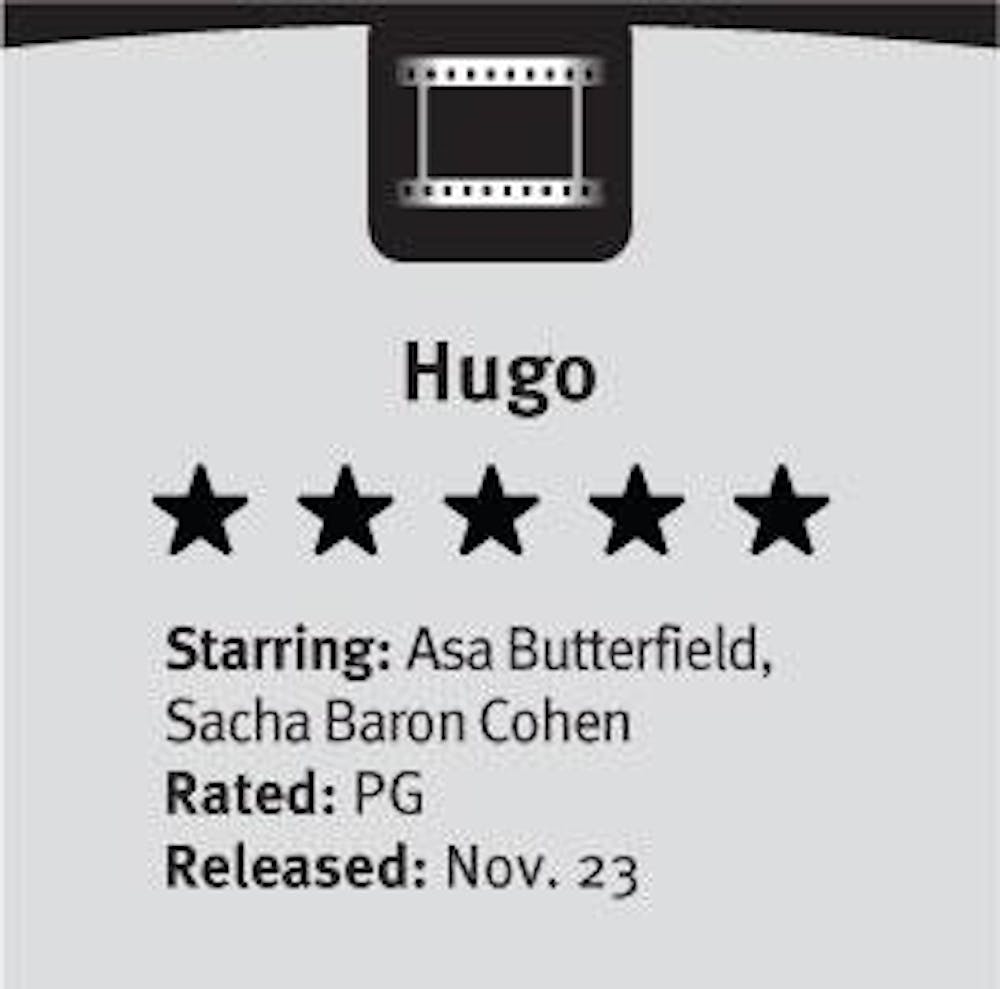Martin Scorsese animates children's imaginations with Hugo

Hugo is an emotional children's story, a light-hearted romantic comedy, a thrilling mystery, an existential journey, and an ode to dreams and filmmaking wrapped into one beautiful film. A movie of this caliber is business as usual for director Martin Scorsese, but this genre of movie certainly is not. The man behind the masterpieces Taxi Driver, Raging Bull and Goodfellas is known for ultraviolent, profane gangster flicks. Hugo is Scorsese's first children's movie as well as his first 3-D movie. Scorsese ventures into a new style of directing and owns it like the greatest director of ?this generation.
Hugo Cabret (Asa Butterfield, The Boy in the Striped Pajamas) is a preteen orphan who lives behind the clocks of a train station in 1930s Paris. From flashbacks, we learn that Hugo's father (Jude Law, Sherlock Holmes) died in a fire. Hugo is mechanically skilled, so he maintains all of the clocks. He steals food from carts and tools from the toy shop owner, Georges Melies (Ben Kingsley, Prince of Persia: The Sands of Time). His thievery gains the notice of the station inspector (Sacha Baron Cohen, Borat) who is too eager to round him up and send him to the orphanage. Hugo has become so lonely that his closest friend is an automaton that his father picked up from a museum and that they collaboratively rebuilt. Hugo believes that his father left a secret message for him that the automaton will write when activated. The toy shop owner catches Hugo stealing and finds his notebook that contains diagrams of the automaton. Assuming that the notebook was also stolen, he decides to go home and burn it. Hugo runs to the toy shop owner's house to save the notebook when he meets the man's adopted daughter Isabelle (Chloe Grace Moretz, Kick-Ass).
Isabelle, curious about Hugo's attachment to the notebook, starts spending all her time with him. When Isabelle reveals that her father forbids watching films, Hugo sneaks them into a theater. She is captivated by how films bring dreams to life. Eventually she and Hugo activate the automaton, which in turn provides them with clues of the mystery of Melies.
Interwoven into this main story is a heartwarming romantic subplot involving the station inspector. He is trying to win the love of a flower saleswoman (Emily Mortimer, Shutter Island) but has to battle his awful conversation starters such as, "Your flowers … ?are they smelly?"
Hugo is not only beautiful emotionally but looks and sounds beautiful. CGI is the right choice to create Scorsese's fantasy of 1930s Paris. The film opens with its score accompanying a fabulous tracking shot that first travels through the train station, then follows Hugo through the innards of the clocks where he lives and finally to the image of Paris through a clock face. The whole sequence is about five minutes and contains no dialogue. We learn more about Hugo in those five minutes than we do about most protagonists by the end of most movies. The score plays for almost the whole film and for good reason; it perfectly accompanies the mood of every scene. Scorsese uses a sound technique that I have never heard before. When the characters have an important line, their voices boom and echo throughout the theater. I normally hate 3-D movies because it's usually a director's gimmick to charge an extra $3.50 per ticket. However, Hugo actually makes sense in 3-D, and I can't imagine watching it any other way.
In Hugo, the characters say that films can reflect our dreams on the big screen. Beyond that, films can create our dreams. All directors remember that one movie that made them decide to dedicate their lives to cinema. Hugo will be one of those films for our generation.
More from The Rice Thresher

Over 1,000 students petition against new meal plan
When Konstantin Savvon opened the Housing and Dining email announcing the new unlimited meal plan, he was instantly concerned about the impact on off-campus students like himself.

Rice football wins season opener under new coach
For the first time since 2018, Rice football opened its season with a victory. Scott Abell was soaked with yellow Powerade following a 14-12 win on the road Saturday against the University of Louisiana at Lafayette, which won 10 games and made it to the Sun Belt Conference championship last season.

Acting like an athlete: Rice basketball alum takes on Broadway
Underneath Chadd Alexander’s Broadway costume, there’s ankle tape and wrist braces — same protective gear he wore as a walk-on basketball player at Rice, though now he’s performing eight shows a week in the ensemble of “Harry Potter and the Cursed Child” instead of running conditioning drills in Tudor Fieldhouse.

Please note All comments are eligible for publication by The Rice Thresher.